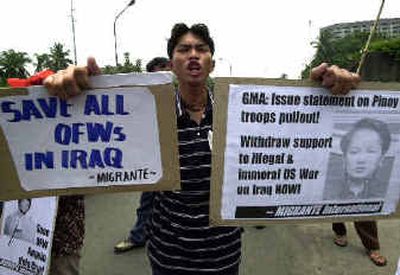Filipino troops cut in bid to save hostage

BAGHDAD, Iraq – The Philippines withdrew 11 more soldiers from Iraq on Friday to meet the demands of kidnappers holding a truck driver hostage, ignoring warnings from Washington that the move sends the wrong signal to terrorists.
The decision by Philippine President Gloria Macapagal Arroyo to pull out peacekeepers from Iraq outraged U.S. allies in the war on terror, who fear that bargaining for the life of Angelo dela Cruz will set a dangerous precedent.
The 51-member Filipino contingent had been scaled back to 43 in recent days. A further 11 Filipinos – the head of the humanitarian mission and 10 other soldiers – drove over the border into Kuwait on Friday in three vehicles and were seen off by a delegation of U.S. troops, said Lt. Col. Hashem Abdullah, an Iraqi officer at the border town of Safwan.
Meanwhile, American troops and their Iraqi allies in the capital, Baghdad, continued to face attacks. Insurgents detonated a car bomb targeting a U.S. military convoy in Baghdad, wounding one U.S. soldier and four civilians, the U.S. command and Iraqi police said.
Also, attackers fired machine guns and rocket-propelled grenades at an Iraqi police patrol, killing one and wounding another, police officer Ammar Naji said.
The violence came amid warnings by interim Iraqi Prime Minister Iyad Allawi that insurgents would hit harder in the coming weeks. He announced creation of a new intelligence service Thursday designed to combat terrorism and vowed to annihilate guerrillas seeking to derail efforts to bring peace.
Suicide bombings, shootings and car bombs have rocked the country since the transfer of sovereignty from U.S. occupation officials to the interim Iraqi government on June 28.
In recent months, insurgents have also kidnapped dozens of foreigners in hopes of pressuring countries taking part in the U.S.-led coalition to withdraw. The strategy also appears intended to further isolate the United States, which already provides the bulk of the 160,000-member multinational force in Iraq.
Despite the ferocity and number of attacks in recent days, most coalition countries said this week they are standing firm.
El Salvador’s legislature approved an extension late Thursday of its 380 troops in Iraq. Italy, whose contingent of 3,000 troops is the third-largest in Iraq, has no plans to pull out. Neither does Poland, with 2,500 soldiers; Romania, with 730 infantry and military police; Denmark, with 500 troops; Hungary, with 300; nor the Czech Republic and Slovakia, with about 100 each.
Bulgaria, which has 480 troops in Iraq, was working desperately to win the freedom of a captive Bulgarian truck driver after another driver reportedly was killed this week. It reiterated its determination Friday to remain in Iraq, despite calls by lawmakers and other groups to pull out.
Arroyo had faced overwhelming pressure from the public at home, where many have family members working abroad. More than 7 million Filipinos work overseas.
People lit candles and held prayer vigils Friday for the safe return of dela Cruz, who was taken hostage by militants while working as a truck driver.
In agreeing to pull out peacekeepers, Arroyo also decided not to allow any more Filipino workers to come to Iraq. But that does not affect the thousands of Filipinos already at U.S. bases performing menial tasks such as serving food and cleaning toilets to free military personnel for crucial combat duty.
“The more than 4,000 Filipino workers in Iraq shouldn’t be there,” said Connie Regaled, head of Migrant, a Filipino pressure group for overseas workers. “Most of them are in U.S. military installations, where they’re the first target of Iraqi rebels.”
Other coalition members, such as Australian Prime Minister John Howard, called the decision a mistake.
“If you give in, the game’s over and they will increase the intensity of their attacks,” he said.
White House press secretary Scott McClelland said the decision “sends the wrong signal to terrorists.”